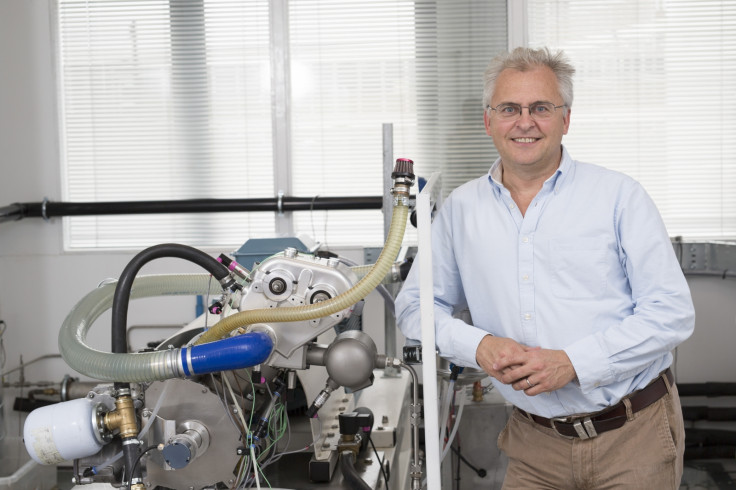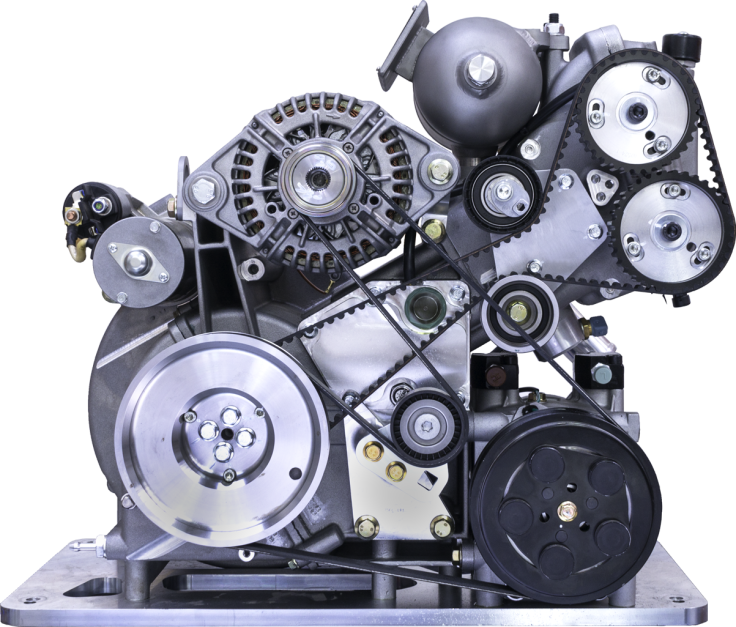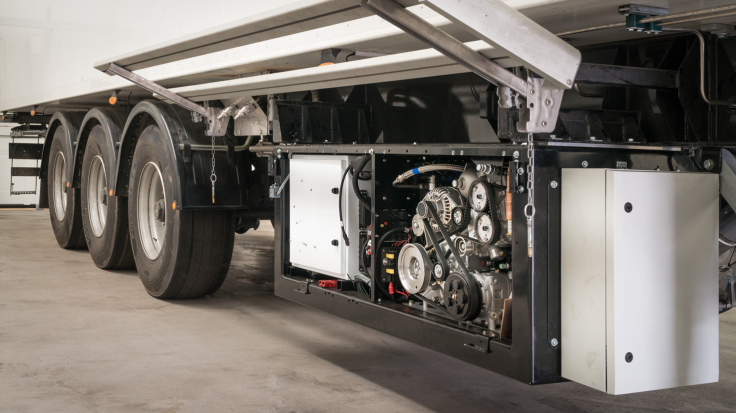'Emission-free chills': Start-up propagates Nitrogen for clean power and refrigeration
Toby Peters, Founder of Dearman, discusses his strategy for selling disruptive technology in a conservative market.

Back in 2004, academic and industry consultant Toby Peters came across inventor Peter Dearman who was touting the idea of a nitrogen-powered motor engine. When the duo met, Peters was astounded by what he saw before him.
"[Peter] Dearman had a car running on liquid nitrogen, with the engine conjured up by an eclectic mix of parts. The fuel tank was a beer barrel, and some of the components included an old coca cola bottle. His car was doing 30 miles an hour. Having the scientific concept sussed out by Leeds University colleagues, I found it to be robust," Peters tells IBTimes UK.
And so began the journey of Dearman, the clean technology company named after the inventor who came up with the "original Dearman" engine. In 2011, by the time company started getting commercial traction, and piqued wider interest, it had become a very different animal.
Cool motor to 'clean cooling'
Peters thought, as things stood then, pitching a car running on a liquid nitrogen-powered engine was "slightly fanciful" to prototype and market.
Instead, the company switched tack to pitching and providing "clean cooling" solutions in an increasingly carbon emissions wary world, realising its engine's potential was not just in powering things up, but rather in powering and cooling.
"We could move our product to market with known, readily available components – our first prototype used the bottom end of Yamaha quadbike. We saw a low hanging fruit opportunity where we could prove the technology worked and it had a real need.
"For me cold is the Cinderella of the energy debate. Policymakers think about heat, electricity and energy security - but we don't often talk about cooling which is the backbone of our society. Around 70% of our food goes through cold chain at some point, some 50% of data centre energy usage is for cooling. In the Middle East, 50% of energy consumption is for cooling, while studies suggest subsistence farmers in India tragically end up losing 40% of their harvest on account of lack of a viable cooling chain."
Simply put, demand for cooling will overtake demand for heat by 2060, and by the end of this century the demand for air conditioning alone is going to increase 33 times from where we are today. "So we thought, we ought to be turning our attention to achieving the objective of cooling in a carbon neutral fashion, rather than how much electricity or power do we need."
Peters says if the world is keen on solving the food, water and energy trilemma, solving the 'cold chain' would make a tangible impact on all three. "That is our core mission. Of course, selling disruptive technology in quite a conservative market is never easy."
Dearman's suite of nitrogen-powered cooling applications are aimed at transport, energy and data centre companies, but atop the pile is the food retail sector, which needs mobile as well hub refrigeration.
"Transport refrigeration is our central pitch at the moment, via a technology that is bolted on to the vehicle once the vehicle is complete, rather than built into the architecture.
"We use liquid nitrogen to go after an application which has been fundamentally underinvested in over the last 50 years. Transport refrigeration lags efforts by truckmakers who have made their internal combustion engines remarkably efficient, ditto has happened with auxiliary engines for coach passenger air-conditioning; not deemed a large enough market for the automakers."
A pragmatist not an evangelist for clean cooling
Peters says he's not an "evangelist" for clean cooling, rather someone who has gone down the path of environmental considerations mindful that they could addressed by viable business solutions Dearman is pitching.

"Food and groceries transport fleet managers want the cold stuff to reach its target on time and on budget. We are about ensuring the alternative technology we offer is robust.
"Our job at Dearman is not merely to show that the business is green, rather to show that there is an economic case for it, i.e. running a transport refrigeration unit on liquid nitrogen against the fuel tank's diesel is cost competitive.
"We have a pull down from ambient temperature to the -20-25 C range of sub 30 minutes; a traditional diesel engine takes about two hours. Furthermore, ours is quieter!
"Lower costs also matter when you look air-conditioned buses with 40-50% of their diesel usage being down to cooling people. Finally, as we seek to replace diesel, currently available battery-powered solutions simply cannot cope, nitrogen-powered options can."
This year Dearman will install 20 cooling units with "high profile" brands. The first of those brands to put faith in the company's cooling concepts is none other than supermarket Sainsbury's.
From British supermarkets to emerging markets
Peters first started talking to Sainsbury's sustainability division in 2012-13. "I felt it was very important to develop a technology with an understanding of the marketplace, rather than build it in isolation from the marketplace. You want to know whether there is an appetite, and we were delighted that Sainsbury's displayed that appetite."
In 2016, the first Sainsbury's vehicle hit the roads with Dearman's cooling solution. "And second vehicle is going to them in July (2017)."

However, these days Dearman has spread its wings well beyond UK shores – with ongoing discussions to export its technologies to emerging markets such as China, India and Malaysia. Yet, Peters is concerned about Brexit, and its aftermath once London and Brussels have carved out a deal.
"For us, whilst India and China, are great long-term opportunities, the reality is that the first place we would look for volume deployment of our technology, after, or in parallel to the UK, is Europe – our launch marketplace.
"Brexit is going to happen around us. Without getting into the politics of it all, for businesses like ours, we want security around access to skills, security around the European grant funding programme, and last but not least, security around access to the common market."
The beauty of liquid nitrogen
Both in the UK and abroad, Peters says, Dearman's business pitch remains simple – recognise the beauty of nitrogen.
"Air we breathe is 78% nitrogen, so the mechanism for getting our working fuel – liquid nitrogen – is well advanced, with no issues in terms of availability. While we partner with Air Products, the industrial gas business is very mature, when it comes to liquefaction of Nitrogen. The product they produce is primarily liquid oxygen, but for every unit of liquid oxygen you end up producing four parts of liquid nitrogen as a surplus capacity by-product."
Peters says Dearman and the end users of its technology can lay their hands on a couple of thousand tonnes of liquid nitrogen quite easily. "So from a transport managers' perspective, a fleet can actually be built without having to fret about (or prove) the infrastructure."
By that argument, in Europe, Dearman could hypothetically put down 27,000 of its engines, based on current regional nitrogen production capacity, before additional capacity would be needed to bolster supplies.
"We were not facing a chicken and egg situation; we could go to the existing supply chain. There's beauty of the fuel procurement dynamic."
So what next for Dearman? "Founders have a tendency to stick around too long; I'm not one of those. There's a new chief executive officer in place, whom I offer strategic advise.
"In 2011, it was just two people, now it's a team of 75 and growing. Food retail brands, and others, are recognising what we bring to the table. A major new investor – Park Vale Capital – has come our way and they've put in £16m in funding.
"We also have a local enterprise partnership loan, and encouragingly enough the government has put £18m into the thermal energy research accelerators, specifically to develop thermal rather than electrical energy, and cooling rather than heating. The future holds a lot of promise."
© Copyright IBTimes 2025. All rights reserved.






















